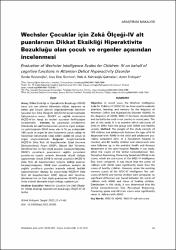Wechsler Çocuklar İçin Zekâ Ölçeği-IV Alt Puanlarının Dikkat Eksikliği Hiperaktivite Bozukluğu Olan Çocuk ve Ergenler Açısından İncelenmesi
Özet
Amaç: Dikkat Eksikliği ve Hiperaktivite Bozukluğu (DEHB)
tanısı için son yıllarda ülkemizde dikkat, öğrenme ve
bellek gibi bilişsel işlevleri değerlendirmede Wechsler
Çocuklar İçin Zekâ Ölçeği-IV (WÇZÖ-IV) kullanılmaktadır.
Çalışmamızın amacı, DEHB’li ve sağlıklı örneklemin
WÇZÖ-IV’ün hangi alt testleri açısından farklılaştığını
incelemektir. Yöntem: Bu çalışmanın örneklemini
İstanbulda bir vakıf hastanesinin çocuk ve ergen psikiyatrisi polikliniğinde DEHB tanısı alan 6-16 yaş aralığındaki
100 çocuk ve ergen ile aynı hastanenin çocuk sağlığı ve
hastalıkları bölümünde takip edilen sağlıklı 88 çocuk ve
ergen oluşturmaktadır. Bulgular: Araştırmamızda
WÇZÖ-IV Zeka Testi alt boyutlarından Sözel Kavrama
Dönüştürülmüş Puanı (SKDP), Algısal Akıl Yürütme,
İşlemleme hızı ve Tüm ölçek puanları karşılaştırıldığında,
DEHB’li çocukların puanlarının sağlıklı çocukların
puanlarına kıyasla anlamlı derecede düşük olduğu
saptanmıştır. Ancak DEHB ile normal çocukların WÇZÖ-IV
Zeka Testi alt boyutlarından Çalışma belleği puanları
karşılaştırıldığında, DEHB olan çocukların puanları ile
sağlıklı çocukların puanları arasında anlamlı farklılık
saptanmamıştır. Sonuç: Bu araştırmada WÇZÖ-IV Zeka
Testi alt boyutlarından SKDP, Algısal Akıl Yürütme,
İşlemleme hızı ve Tüm ölçek puanlarının DEHB’li çocuklarda anlamlı derecede düşük olduğu saptanmıştır. Objective: In recent years, the Wechsler Intelligence
Scale for Children-IV (WISC-IV) has been used to evaluate
attention, learning, and memory for the diagnosis of
Attention Deficit and Hyperactivity Disorder (ADHD). In
the diagnosis of ADHD, WISC-IV has been standardized
and started to be used in our country in recent years. The
aim of this study, it is to examine which sub-scores of
WISC-IV differ from the group with ADHD and healthy
sample. Method: The sample of this study consists of
100 children and adolescents between the ages of 6-16
diagnosed with ADHD in the child and adolescent psychiatry outpatient clinic of a foundation hospital in
Istanbul, and 88 healthy children and adolescents who
were followed up in the pediatric health and diseases
department of the same hospital. Results: In our study,
when the scores of the Verbal Comprehension Test,
Perceptual Reasoning, Processing Speed and Whole scale
scores, which are sub-scores of the WISC-IV Intelligence
Test, were compared, it was found that the scores of
children with ADHD were significantly lower than the
scores of healthy children. However, when the working
memory scores of the WISC-IV Intelligence Test subscores of ADHD and normal children were compared, no
significant difference was found between the scores of
children with ADHD and those of healthy children.
Conclusion: In this study, it was determined that the
Verbal Comprehension Test, Perceptual Reasoning,
Processing speed and All scale scores were significantly
lower in children with ADHD.
Cilt
25Sayı
1Bağlantı
https://hdl.handle.net/11363/5736Koleksiyonlar
Aşağıdaki lisans dosyası bu öğe ile ilişkilidir:


















